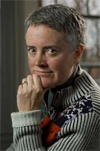 Young parents from Holyoke will publicly present digital stories next week that were produced as part of “Hear Our Stories: Diasporic Youth for Sexual Rights and Justice,” a collaborative project between the University of Massachusetts Amherst and several grassroots advocacy organizations.
Young parents from Holyoke will publicly present digital stories next week that were produced as part of “Hear Our Stories: Diasporic Youth for Sexual Rights and Justice,” a collaborative project between the University of Massachusetts Amherst and several grassroots advocacy organizations.
The first-person video narratives feature parents who have been involved in the Care Center, a Holyoke-based alternative education program for pregnant and parenting teens who have dropped out of high school. They will present their short videos on Wednesday, May 7 from noon to 2:00 p.m. at the Visitor’s Center at Holyoke Heritage State Park. In addition to screening digital stories, this event will include a project overview, participatory activities for the audience and a panel from the storytellers.
Holyoke has the highest rate of births in Massachusetts to young women ages 15 to 19. Although there are many young parents in the community, they seldom have an opportunity to share their experiences with the public. The Hear Our Stories project is funded by the Ford Foundation and uses personal stories to educate the public about how young parenting women experience and negotiate sexual disparities. With training and production help from the Center for Digital Storytelling, the participating parents combined audio recordings, still and moving images, and music or other sounds to communicate an experience in the form of a video story.
This project is a collaboration of the UMass Amherst School of Public Health and Health Sciences, Department of Anthropology and the Center for Public Policy and Administration; the Care Center; the Center for Digital Storytelling; the Massachusetts Alliance on Teen Pregnancy; the National Latina Institute for Reproductive Health, and the Mauricio Gaston Institute for Latino Community Development and Public Policy at UMass Boston.
 Professor Joya Misra (sociology and public policy) is one of six university faculty members chosen to be a Family Research Scholar at the
Professor Joya Misra (sociology and public policy) is one of six university faculty members chosen to be a Family Research Scholar at the  Associate Professor Brenda Bushouse (political science and public policy) will speak on a panel called “Mothers in Academia” on Friday, Feb. 15, in Campus Center Room 803 from 2 to 4 p.m.
Associate Professor Brenda Bushouse (political science and public policy) will speak on a panel called “Mothers in Academia” on Friday, Feb. 15, in Campus Center Room 803 from 2 to 4 p.m. Madeleine M. Kunin, former governor of Vermont and ambassador to Switzerland, told an audience of about 80 on Tuesday that it’s high time women were able to fully realize the goals that feminists set in the 1960s. And, she said in an upbeat message, achieving those goals is possible.
Madeleine M. Kunin, former governor of Vermont and ambassador to Switzerland, told an audience of about 80 on Tuesday that it’s high time women were able to fully realize the goals that feminists set in the 1960s. And, she said in an upbeat message, achieving those goals is possible.